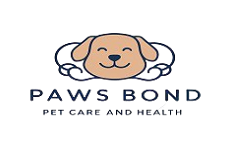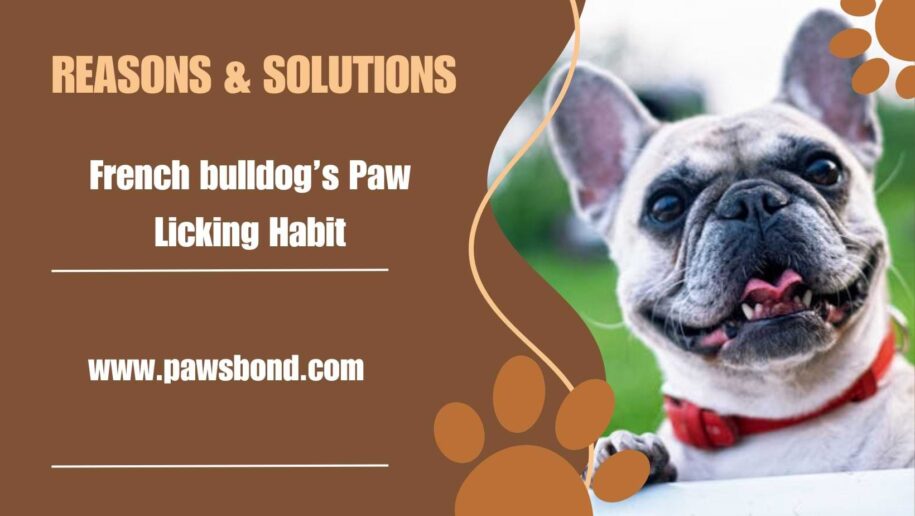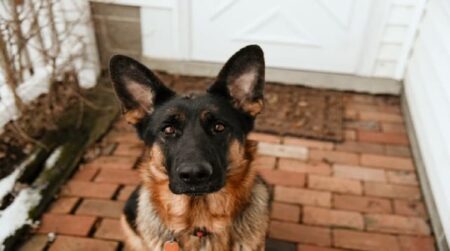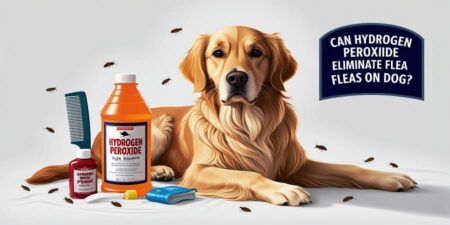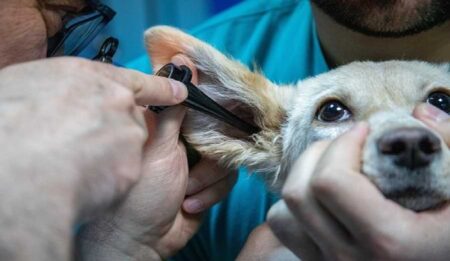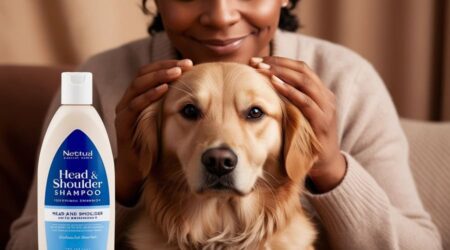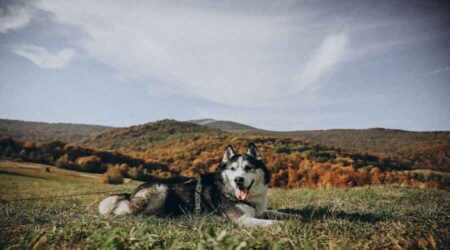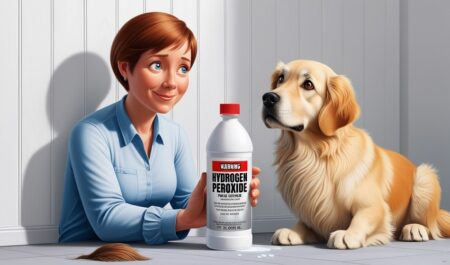For the sake of both your mental health and your French bulldog’s wellbeing, you must address their behavior of paw licking. Overindulgence in paw licking may be a sign of deeper problems such allergies, infections, boredom, or nervousness. An interdisciplinary strategy is required to address this behavior in an effective manner. A trip to the veterinarian is essential in the first place to rule out any medical issues that might be causing discomfort. After attending to any medical concerns, considerations might shift to nutrition, mental stimulation, and environmental variables. Strategies to help break the licking behavior include keeping your dog’s paws fresh and clean, offering distractions, employing positive reinforcement tactics, and taking deterrents into consideration. Long-term success can also be facilitated by locating and removing any allergens as well as treating any underlying stressors or anxiety. Through the application of these
Reasons for French bulldog Paw Licking and Their Fix
Excessive paw licking in French bulldogs can be caused by allergies, illnesses, or behavioral problems like boredom or nervousness. Medication, avoidance of allergens, and dietary modifications can all be used to treat allergies. Veterinary care for infections must include the use of antibiotics and antifungal drugs. Exercise, positive reinforcement training, and more mental stimulation may be necessary to address behavioral disorders. Additionally helpful are routine paw cleanings and keeping the paws dry. It is essential to speak with a veterinarian in order to identify the underlying problem and create a successful treatment strategy. You may assist your French bulldog stop paw licking and enhance their general health by treating the underlying issue.
What Causes French Bulldogs to Paw-Lick?
Allergies to food or environmental irritants like pollen can cause French bulldogs to paw-lick, which can cause discomfort and irritation. Paw-licking can also be brought on by infections, such as those caused by yeast or bacteria. This habit may also be triggered by behavioral problems such as stress, boredom, or anxiety as a self-soothing technique. Effective treatment requires determining the underlying reason and addressing it. This could entail altering one’s diet, avoiding allergens, using antibiotics, or using behavior modification strategies. Maintaining dry paws and practicing good paw care can also help ease the issue. Seeing a veterinarian is essential for an accurate diagnosis and customized care to address the paw-licking problem.
Grooming
For French bulldogs to stay healthy and look good, they must be groomed. In their short coat, regular brushing helps prevent matting and regulate shedding. To prevent skin irritation, bathing your dog should be done once a month or more often as needed. Use a gentle shampoo. Regularly cleaning their ears and facial creases helps shield them from illness. In order to avoid discomfort and overgrowth, nail cutting is essential. Oral health requires regular dental care, such as brushing one’s teeth. Lastly, early identification and timely treatment are ensured by monitoring for any indications of skin problems, parasites, or abnormalities during grooming sessions. Regular grooming helps French bulldogs stay healthy.
Allergies to food
Food allergies in French bulldogs can result in a range of symptoms, including paw licking, skin irritation, itching, and digestive problems. Dogs frequently have allergies to wheat, soy, dairy, maize, meat, and chicken. A veterinarian must perform allergy tests or a process of elimination using a special diet in order to identify the particular allergen. Changing to a hypoallergenic or new protein diet is part of the treatment once the allergen has been identified. It’s also important to stay away from snacks and table scraps that contain allergies. In order to properly treat food allergies and protect your French bulldog’s health and wellbeing, it is important to regularly evaluate your dog’s symptoms and visit a veterinarian.
Skin irritation
Food allergies in French bulldogs can cause paw licking, skin irritation, itching, and digestion issues, among other symptoms. Allergies to wheat, soy, dairy, maize, pork, and chicken are common in dogs. To determine the specific allergen, a veterinarian must conduct allergy testing or a process of elimination using a special diet. Once the allergen has been identified, part of the treatment involves switching to a hypoallergenic or novel protein diet. Avoiding allergen-containing snacks and table leftovers is also crucial. It’s critical to routinely assess your French bulldog’s symptoms and see a veterinarian in order to treat food allergies effectively and safeguard their health and welfare.
Worry or Stress
French bulldogs’ body language and mannerisms can indicate worry or apathy. Pacing, panting, shaking, whining, or looking to their owner for comfort are some indications that they are worried. Disinterest in activities, a lack of response to instructions, or an avoidance of social connection can all be signs of indifference. Distinguishing between concern and apathy can be facilitated by being aware of your dog’s unique temperament and behavior indicators. Positive reinforcement training, creating a soothing and comforting atmosphere, and participating in bonding and mental stimulating activities can all help reduce anxiety and improve your relationship with your French bulldog.
Infection of parasites
Many parasites, including fleas, ticks, mites, and worms, can cause parasitic diseases in French bulldogs. Numerous health problems, such as skin irritation, itching, hair loss, anemia, and gastrointestinal troubles, can be brought on by these parasites. The chance of infection can be decreased by taking preventative steps such routinely using flea and tick prevention treatments, maintaining a clean living environment for your dog, and avoiding locations with high parasite concentrations. In order to protect your French bulldog’s health and wellbeing in the event of a parasitic infection, you must treat your dog right away with the right drugs that your veterinarian has prescribed.
Do French bulldogs typically lick their paws?
It is true that French bulldogs, like many other dog breeds, may lick their paws from time to time as part of routine grooming. On the other hand, excessive or compulsive paw licking may be a sign of a more serious condition such allergies, infections, skin irritation, or behavioral issues. It’s critical to keep an eye on your French bulldog’s behavior and get advice from a veterinarian if you observe them licking their paws excessively in order to determine and treat any possible underlying problems. You may contribute to ensuring the health and wellbeing of your French bulldog by treating the underlying cause of the paw licking.
What is the best way to stop my French bulldog from licking its paws?
The best method for getting your French bulldog to quit licking its paws is to figure out what the root of the problem is and treat it. To rule out any medical conditions, such as allergies or infections, speak with a veterinarian. Offer both mental and physical stimulus to stop licking that stems from boredom. To reward desired behaviors and divert attention when paw licking occurs, use positive reinforcement. Maintaining clean and dry paws will help your dog feel less irritated. Take into account dissuaders such as acrid-tasting sprays, but always check with your veterinarian first. You may successfully stop your French bulldog from licking his or her paws excessively by being consistent, being patient, and addressing the underlying reason.
How can I relieve the paw itchiness on my dog?
There are multiple processes involved in relieving your dog’s paw itching. To find out the underlying cause which could be allergies, illnesses, or parasites—first speak with a veterinarian. They might recommend drugs like antibiotics or antihistamines. Itching can be relieved by topical remedies such medicated shampoos or ointments. Taking warm water and Epsom salts foot soaks on a regular basis will help relieve inflammation. Consider wearing safety boots and make sure your dog’s paws are clean and dry. If allergies are suspected, dietary adjustments might be beneficial. Reduce your dog’s exposure to allergens by controlling their surroundings. Complete care for your dog’s paw itching is ensured by routine grooming and, if required, consultation with a veterinary dermatologist.
Conclusion:
Treating your dog’s paw itchiness needs to be comprehensive and based on the underlying cause. For an accurate diagnosis and recommended course of treatment, speaking with a veterinarian is imperative. Medication, topical treatments, and foot soaks can offer relief from allergies, infections, or parasites. Important responsibilities also include managing the surroundings, nutritional modifications, and paw hygiene. Consistent grooming and, where required, specialized consulting guarantee all-encompassing care for your dog’s comfort and welfare. Paw itching can be swiftly and efficiently treated to help your pet live a happier, healthier, and discomfort-free life.
